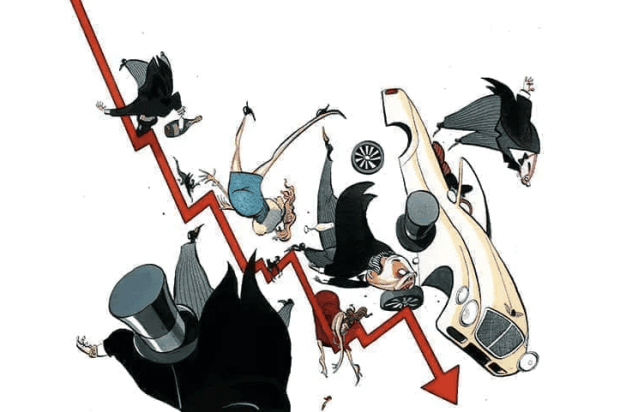Paying tax — which many of us have been doing this week before HMRC’s 31 January deadline — is a citizen’s duty, not an act of virtue. But for the very rich it is also a choice, since with the help of expensive advisers they can duck it or pay very little of it by using complex avoidance devices and offshore havens. So if they stay onshore and pay up, we should salute their good citizenship — if only to encourage others like them who might lighten the tax burden for the rest of us.
In that context I was pleased to see two of this column’s controversial heroes of modern capitalism in the Sunday Times list of the UK’s 50 highest taxpayers. The Coates family of Stoke-on-Trent, who have reaped a £5 billion fortune by converting their betting shop chain into the online gaming giant bet m365, take second place on the list, behind low-profile sportswear tycoon Stephen Rubin; you might recall my remark that the tax on the Coateses’ wages of gambling sin must be paying for most of their local NHS provision. Sure enough, the £156 million they handed over last year equalled three-quarters of the running costs of the Staffordshire and Stoke-on-Trent NHS Trust.
Damehood surely can’t be far off for chief executive Denise Coates. And there must be a gong soon for No. 20 and the high street’s last hope, Mike Ashley of Sports Direct (£30 million tax paid), who is reported to be looking at possible rescue bids not only for HMV but also for Patisserie Valerie. Both are at least as worthy as Sir James Dyson at No. 3 (£128 million), who is moving his HQ to Singapore, and Sir Jim Ratcliffe who looks out of place at No. 5 (£110 million) since it’s his company, Ineos, that pays the tax, Ratcliffe himself having announced shortly after he was knighted that he was moving to no-tax Monaco.
Mighty fallen
I wonder how many of you bothered to read Tesco’s recent news stories about 9,000 job losses on axed fresh-food counters, or the £129 million fine it paid to avoid prosecution over the overstatement of its 2014 profits, or the collapse of trials for fraud of several of its former executives. I wouldn’t be surprised if you flicked past them just as you probably drive past the stores in search of a Waitrose, a Lidl or an Aldi. It’s five years since I described this once-mighty supermarket chain as ‘loved by no one… too big, too dull, too dominant… [and] worse than that, actually hated by many for its brutal impact on townscapes and small shops’. A prize example of how empires rise and fall, Tesco must be glad to garner any headlines at all these days.
Asahi Pride?
Any major inward investment from a non-EU source is usually celebrated as affirmation that the rest of the world still thinks of the UK as an exciting place to trade. But I have not heard a single cheer for the £250 million sale of the beer business Fuller Smith & Turner, maker of London Pride ale, to Asahi of Japan. That’s a rich price to divide between the descendants of Fuller’s Victorian founders and their fellow shareholders, and the Japanese buyers have said they will continue to operate the historic brewery beside the Hogarth Roundabout on the Great West Road. But ale buffs fear the site will swiftly go the way of Young’s Ram Brewery in Wandsworth and the less lamented Watney’s at Mortlake, wiped off the map by residential gentrification — while Fuller’s itself, like Young’s, will remain only as a chain of ‘premium pubs’.
Why be sentimental? I suppose because we used to be a nation of great brewers, just as we were great shipbuilders and nuclear engineers, and now we’re not. As for Asahi, it ranks seventh in global brewing and top in Japan, where — as I know from my years as an expat there —after-hours ‘salarymen’ drink vast quantities of its fizzy product in karaoke bars without really tasting it, since their choice of brand often has more to do with corporate loyalty: Asahi is part of the Sumitomo corporate tribe, while rival Kirin is a Mitsubishi company.
Perhaps that’s no worse than drinking the many indistinguishable brands of the mega-conglomerate AB InBev which has swallowed so much of the global beer industry; and despite that trend there’s still decent bitter to be had in the traditional pubs that survive. Up north, we swear by Black Sheep from Masham. But a pint of London Pride will never taste quite the same again.
Burns and Brexit
‘Catch the moments as they fly/ And use them as ye ought, man,’ wrote Robert Burns, whose 260th birthday was marked in Blackpool (says the Sun) with a ‘wild tartan-themed swingers’ party’. That might have been a better use of parliamentarians’ time than recent Westminster shenanigans — but Burns’s advice, along with his line about ‘the best laid schemes’ going ‘aft agley’, brought a fresh Brexit thought to mind. Most businesses I know (apart from those like Dyson and JCB that had trouble selling into Europe) are horrified both by the decision and the shambolic negotiation, but prepared to muddle through. Most voters I know just want the nightmare to be over and have no faith that delay would lead to something better. The moments are flying towards an unstoppable exit on 29 March. So be it — but why not declare now that there will be a second referendum on Thursday 24 June 2021, asking ‘stay out?’ or ‘go back in?’
At a full parliamentary term’s length since the first referendum, no one could claim such a poll was purely designed to subvert 2016’s Leave result. Few independent trade deals are likely to have been signed by mid-2021 but voters would be far better informed by experience as to what Brexit really means. If they chose ‘stay out’, history would judge the whole episode a democratic success. If not, Brussels would welcome us back, perhaps even on better terms than before. All options are supposedly still on the table: why not this one?
Got something to add? Join the discussion and comment below.
Get 10 issues for just $10
Subscribe to The Spectator Australia today for the next 10 magazine issues, plus full online access, for just $10.
You might disagree with half of it, but you’ll enjoy reading all of it. Try your first month for free, then just $2 a week for the remainder of your first year.















Comments
Don't miss out
Join the conversation with other Spectator Australia readers. Subscribe to leave a comment.
SUBSCRIBEAlready a subscriber? Log in